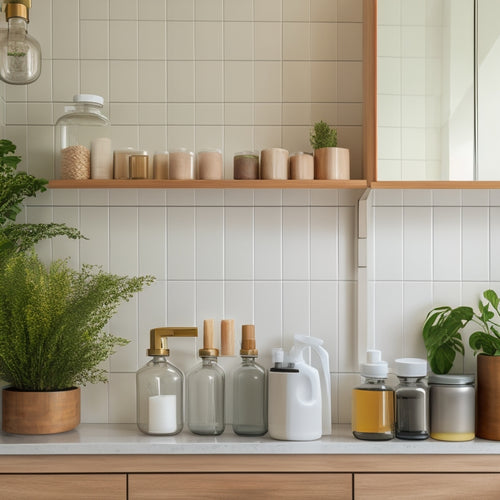
Silicone: The Ultimate Food Storage Solution
Share
Silicone, a synthetic material, offers a unique combination of flexibility, high and low-temperature resistance, low chemical reactivity, and water-repelling properties, making it an ideal solution for food storage. Its non-toxic, BPA-free, and phthalate-free nature guarantees safe food handling and storage. The water-repelling properties prevent bacterial growth, and its resistance to degradation and breakdown guarantees no contamination of food. With its versatility, silicone is an attractive alternative to toxic plastics. As a reliable and inert material, silicone provides a durable and flexible solution for food storage, and exploring its applications can reveal even more benefits.
Key Takeaways
• Silicone's non-toxic, BPA-free, and phthalate-free properties make it an ideal material for food storage and handling.
• Its water-repelling properties prevent bacterial growth, ensuring safe and healthy food storage.
• Silicone products can withstand extreme temperatures, from microwave to freezer, without leaking or degrading.
• Food-grade silicone is flexible, durable, and resistant to chemical reactions, making it perfect for containers, bags, and bowls.
• Partnering with a trusted supplier like Z.S.R International Group ensures high-quality, customized silicone products for efficient food storage solutions.
Properties of Silicone Materials
Silicone, a synthetic material derived from silicon elements, oxygen, carbon, and hydrogen, exhibits a unique combination of properties that make it an ideal material for various industrial applications, including cookware, electronics, medical equipment, and storage containers. Its flexibility, resembling plastic, is manufactured from silicon extracted from silica.
Importantly, silicone benefits include high and low-temperature resistance, low chemical reactivity, and water-repelling properties. These characteristics make it an excellent choice for diverse silicone applications. Its inert and versatile nature has led to its widespread adoption as a popular alternative to toxic plastics.
The extensive range of silicone applications underscores its value in modern industries, offering a reliable and safe material for various uses.
Safety Features of Food-Grade Silicone
Reliability in food storage and handling is crucial, and food-grade silicone's inherent safety features make it an exemplary material for this purpose. Its durability guarantees that it withstands extreme temperatures, stresses, and environments, making it a trusted choice for the food and beverage sector.
Silicone innovation has led to the development of non-toxic, BPA-free, and phthalate-free products that are safe for contact with food. Food-grade silicone's resistance to degradation and breakdown guarantees that it does not contaminate food or leach harmful chemicals.
Additionally, its water-repelling properties prevent bacterial growth, making it an ideal material for food storage containers, bags, and bowls. By selecting food-grade silicone products, consumers can have confidence in the safety and integrity of their food storage solutions.
Understanding Silicone Technology
The versatility of silicone technology stems from its unique molecular structure, which enables it to exhibit a range of beneficial properties that make it an ideal material for various applications.
Silicone technology is utilized in diverse industries, including cookware, electronics, and medical equipment.
-
It is a flexible material with high and low-temperature resistance, low chemical reactivity, and water-repelling properties.
-
Silicone is marketed as inert and versatile, making it a popular alternative to toxic plastics.
-
It is non-toxic and does not stain food or cookware.
-
Silicone is resistant to extreme temperatures, stresses, and environments.
-
Its unique properties make it an ideal material for food storage solutions, offering safety and convenience.
Safe Food Storage With Silicone
In the domain of food storage, safety is paramount, and silicone-based products have emerged as a trusted solution, offering a non-toxic, flexible, and durable alternative to traditional storage materials.
Silicone benefits include its resistance to extreme temperatures, low chemical reactivity, and water-repelling properties, making it an ideal material for food storage. Silicone applications in food storage are vast, ranging from containers and bags to bowls and molds.
These products are safe for use in the microwave, freezer, oven, and dishwasher, and do not leak, break down, or degrade over time. With silicone, consumers can store food with confidence, knowing that their health and safety are protected.
Partnering With Z.S.R International Group
By collaborating with Z.S.R International Group, a trusted supplier of molded silicone products, companies can leverage the expertise and resources needed to bring their silicone-based food storage solutions to market efficiently and effectively.
-
Z.S.R International Group offers OEM services, providing all-encompassing support from product design to manufacturing.
-
Their molded silicone products are crafted from food-grade silicone, ensuring safety and quality.
-
With extensive experience in silicone molding, Z.S.R Group can help companies overcome technical challenges and optimize their products.
-
Their expertise in silicone technology enables the development of innovative, customized solutions.
-
By partnering with Z.S.R International Group, companies can focus on their core competencies while leaving the silicone molding expertise to the professionals.
Frequently Asked Questions
Can Silicone Products Be Used for Outdoor Food Storage and Camping?
When considering outdoor food storage and camping, silicone products demonstrate exceptional durability, withstanding harsh environments and extreme temperatures, making silicone camping containers a reliable and safe choice for storing food and drinks in outdoor settings.
Are Silicone Products Recyclable at the End of Their Lifespan?
"When the dust settles," silicone products can be recycled, reducing their environmental footprint. Silicone recycling is a viable option, offering a sustainable solution for disposal, thereby minimizing its ecological impact.
Can Silicone Products Be Sanitized in an Autoclave for Medical Use?
Silicone products can be sanitized in an autoclave for medical use, leveraging silicone autoclave sterilization, as medical grade silicone properties guarantee resistance to high temperatures and pressures, maintaining sterility and safety in medical applications.
How Does Silicone Compare to Stainless Steel in Terms of Durability?
"Two titans of durability stand tall: silicone and stainless steel. While stainless steel shines with its scratch-resistance, silicone flexes with its temperature-resistant, non-reactive nature, making it a formidable opponent in the arena of cleaning methods, where gentle care prevails."
Are Silicone Products Compatible With Acidic or Oily Foods?
When storing acidic or oily foods, silicone products demonstrate long-term durability and heat resistance, ensuring safe contact without degradation or chemical leaching, making them a reliable choice for food storage applications.
Related Posts
-

Under-Sink Storage Tips for Minimalist Kitchens
To maximize under-sink storage in your minimalist kitchen, start by utilizing vertical space with shelf risers and st...
-

Over-The-Door Kitchen Rack Installation Tips
To install an over-the-door kitchen rack effectively, start by measuring your door's clearance to guarantee a proper ...
-

Countertop Storage Ideas for Small Kitchens
If you're looking to maximize your small kitchen, creative countertop storage solutions can make a big difference. Em...


